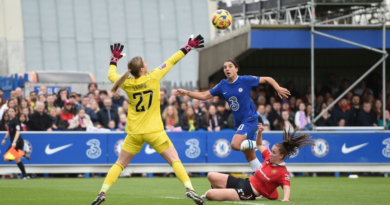Sankey: 'Only Congress' can resolve NIL issues
NASHVILLE, Tenn. — SEC commissioner Greg Sankey on Monday said there is an “urgent need” for Congress to enact a national standard for name, image and likeness and he was emphatic in his belief that “only Congress can adequately resolve these issues.”
Sankey, speaking onstage to a ballroom full of reporters gathered at the Grand Hyatt for the league’s annual media days, used the bulk of his time at the lectern repeating a message he had personally delivered last month to congress members in Washington.
“The reality is, only Congress can fully address the challenges facing college athletics,” he said. “The NCAA cannot fix all of these issues, the courts cannot resolve all of these issues. The states cannot resolve all of these issues, nor can the conferences. Whether congressional action is achievable is a matter of debate. Much debate.
“But educational opportunity, supporting equitable opportunities for men and for women, ensuring the United States’ continued success in the Olympic Games, providing medical care, nutritional support, academic support, mental wellness counseling,” he said, “these are nonpartisan issues that deserve a nonpartisan solution.”
Sankey said that “to our knowledge,” no state has taken action to enforce its own NIL laws. The individual states are also preventing the NCAA and conferences from adopting and enforcing reasonable NIL standards, according to Sankey. He said that while NIL has been “a net positive for young people,” there are also stories of how it has been misused.
“Some stories told and others not told of promises made but not fulfilled, of inducements offered but not provided, of empty commitments, and NIL agreements that created more questions than provided answers and other behaviors in this space that rightly caused concern,” he said. “The reality is our student-athletes deserve something better than a patchwork of state laws that support their name, image and likeness activities if support is the right word.”
Sankey said future collegiate athletes deserve more than “the need to sort through a full unregulated marketplace, being approached by individuals who present themselves as something that they may not be, where anyone can purchase card stock and run it through a printer and call themselves an agent on a business card.”
Sankey said the players he has spoken with throughout the SEC continue to ask for uniformity in NIL policies across the country, and that he has yet to have a conversation with an athlete who says they want to be deemed an employee of a school or conference.
“Our student-athletes want to know their competitors on the opposite line of scrimmage are subject to and governed by the same rules and policies by which they are governed,” Sankey said.
Sankey said leaders throughout college athletics have discussed some level of agent registration, along with a better definition of what exactly NIL is and agreement of the language to describe the activity.
While the bulk of his remarks focused on NIL, Sankey also announced that the conference’s media days will be held in Dallas next summer, a change that aligns with the arrival of Oklahoma and Texas to the SEC. From 1985 to 2017, the SEC held its event in the Birmingham, Alabama, area, but more recently it has twice (2018 and 2022) ventured into Atlanta. This is the first time the event has been held in Nashville.
The SEC will become a 16-team conference in 2024, and Sankey was asked about the league potentially getting even larger.
“I’ve watched others message about, ‘We’re not done yet,'” he said. “I just don’t think that’s healthy. People can criticize me and say, ‘Wow, you really sprung it on people in ’21,’ which we did, and maybe there’s no clean and perfect way to deal with conference membership. It’s not been a topic in the Southeastern Conference other than providing updates so we’re very attentive to what’s happening around us.
“Do I think it’s done?” he said. “People will say I get to decide that. Right now it appears others are going to decide that before we have to make any decisions. My view is we know who we are, we’re comfortable as a league. … You go bigger, there are a whole other set of factors that have to be considered with that. I’m not sure I’ve seen those teased out other than when my mind played out.”




